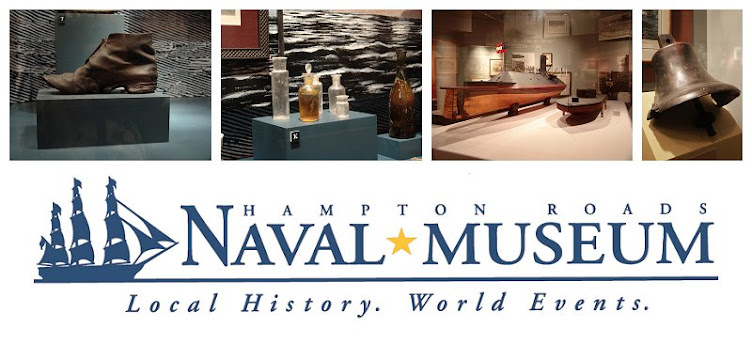 |
| Model shipwright Lee Martin pauses while constructing the brig Alexander at his work table in the Hampton Roads Naval Museum's main gallery. |
No museum dealing with naval history is complete without its models of those tall sailing ships of old. Yes, it would be nice to have full-size ships like the battleship Wisconsin, located just outside our museum, to help illustrate each part of the story we tell about the Navy in Hampton Roads. But we just don’t have room for more than one of those. This is where people with a passion for model shipbuilding make all the difference; people like Lee Martin.
Lee has been the resident model shipbuilder for the Hampton Roads Naval Museum for about two and a half years now. He learned about the museum’s need for a model shipwright (a person who builds, repairs and/or designs model ships) while a member of the Hampton Roads Ship Model Society, which meets at the Mariners’ Museum in Newport News. He now volunteers his time doing live demonstrations of his art at the Hampton Roads Naval Museum.
Like any other experienced shipwright, Lee possesses knowledge of the arcane terminology and specialized techniques of a bygone era that he enthusiastically shares with visitors, fellow volunteers and staff members. Talking to Lee, and watching him work, his love of model ship building is obvious. This could lead one to think he must have spent most of his life working on or around ships.
You would be wrong.
This specialist in centuries-old building techniques actually spent most of his life at the forefront of high technology as a Navy civilian working in computers. He started out programming IBM mainframe computers in the 1970’s for the F-14 Tomcat fighter program and ended his career helping the military develop aircraft inventory and maintenance programs for desktop computers. So, with all this time working with computers and military aircraft, why the interest in model shipbuilding? Like so many who have a love of similar art forms, Lee's answer is simple: “I just always had an interest in model ships."
One of the ships Lee is currently working on is HMS Bellona. The 74 gun “Ship of the Line” was so successful for the British Navy it became the prototype for a whole class of ships known as the Bellona class. “Ship of the Line” referred to warships usually having 50 guns or more. They were the battleships of their time. Lee expects to spend over 800 hours building the model, which means it will take some time to complete, as he only works on it when he can. He is also working on another ship, the US Navy Brig Alexander, within the museum gallery.
 |
Lee Martin trims mahogany floorboards on the foredeck of his latest creation, the brig Alexander.
|
For the museum visitor who wants to see the model ship building process first hand, Lee sets up a work table inside the museum where interested visitors can watch and ask questions. Lee enjoys answering visitor questions, demonstrating the tools and techniques of the trade and showing photographs of other ships he has worked on.
 |
The schooner Black Prince.
|
Just putting together a ship from a kit isn’t good enough for a passionate model shipwright like Lee. He does research to find out as much as possible about the ship and orders special woods from different suppliers to get just the right look. With no photographs of ships in the 1700’s, and changes being made to ships throughout their life, we don’t always know exactly what a ship looked like. According to Lee, “You have to take written descriptions from the time period and compare them to similar ships of the era that we do know what they looked like.” Only then can you get an accurate model.
If you can’t get by the museum on a day Lee is here, a completed example of his work is on display just inside the entrance. The schooner Black Prince was a privateer commissioned by the American government during the Revolutionary war. Privateers were privately owned ships contracted by governments to attack enemy shipping, both military and commercial. The Black Prince and her sister ship the Black Princess were ships Benjamin Franklin bought from the French and had outfitted as Privateers. It took Lee over 450 hours, spread over almost two years, to complete this ship.
If you can’t get by the museum on a day Lee is here, a completed example of his work is on display just inside the entrance. The schooner Black Prince was a privateer commissioned by the American government during the Revolutionary war. Privateers were privately owned ships contracted by governments to attack enemy shipping, both military and commercial. The Black Prince and her sister ship the Black Princess were ships Benjamin Franklin bought from the French and had outfitted as Privateers. It took Lee over 450 hours, spread over almost two years, to complete this ship.
As a volunteer, Lee doesn’t have a set work schedule, but he usually shows up every other Thursday. So, if you want to watch him creating one of his works of art and ask him questions, which he enjoys answering, stop by the museum often. You can also call ahead to find out when he will be here at (757) 322-2987. And as usual, entrance to the Hampton Roads Naval Museum is always free.
Story by Hampton Roads Naval Museum Educator Jerome Kirkland


No comments:
Post a Comment